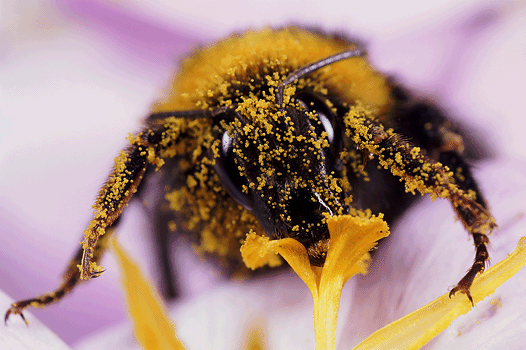European Union Bans Certain Insecticides to Aid Bees
April 29, 2013
The European Commission (EC), the executive body of the European Union, banned the use of insecticides that some researchers have linked to the collapse of bee colonies. Some scientists believe that neonicotinoids—a new class of insecticides chemically related to nicotine—are harming bees. Nicotine is a natural insecticide that is fatal to many insects but less harmful to mammals. Until recently, nicotine-related insecticides were also believed to be less harmful to beneficial insects than traditional formulations.
A recent study in the journal Science, however, linked the use of certain neonicotinoids to a dramatic decrease in queen bees. Another recent study in Science linked insecticide exposure in bees to the problem of forager bees—worker bees that collect nectar
and pollen—having difficulty finding their way back to their hives. The chemical apparently affected the homing ability of the bees.

A bee, covered in pollen, sips nectar from a flower. Many flowers and kinds of food crops depend upon bee pollinators. (© Steve Hopkin, Taxi/Getty Images)
Scientists and environmentalists are very concerned about the health of bees. Honey and other bees pollinate around one-third of the world’s crop production. In 2006, beekeepers in the United States began reporting that large numbers of bees were mysteriously disappearing from their hives—which became known as colony collapse disorder (CCD). It soon became clear that this was a worldwide problem. Scientists are not certain of all the factors involved in CCD. Some of the causes considered likely include mites and other parasites and viruses. Even if these are the primary causes of CCD, however, it could be that certain insecticides weaken the bees and are causing them to be more vulnerable to illness.
The EC ruling states that the use of neonicotinoids should be restricted to crops not attractive to bees and other pollinators. Crops such as wheat and barley, for example, are not of interest to such insects. The EC is imposing a two-year restriction on the neonicotinoids—clothianidin, imidacloprid and thiametoxam—beginning no later than July 1, 2013.
Additional World Book articles:
Additional articles and resources:
- Honey bees and Colony Collapse Disorder (United States Department of Agriculture website)
- Silence of the Bees (Public Broadcasting System (PBS) film produced for the series Nature concerning scientists race to solve the mystery of CDC


